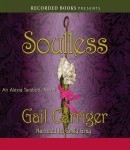Steven R. Southard's Blog, page 83
January 15, 2012
What Happens Next?
Back in May, I promised to discuss suspense, and I've kept you in it long enough. First, in defining the term, we learn that it means (1) the state of being suspended, (2) a mental uncertainty or anxiety, and (3) the state of being undecided or doubtful.
 Definitions (2) and (3) may seem to have the most significance for us here, but I like the image of definition (1). Imagine a character who is physically suspended over the ground at some great height. There is a danger he may fall and get ...
Definitions (2) and (3) may seem to have the most significance for us here, but I like the image of definition (1). Imagine a character who is physically suspended over the ground at some great height. There is a danger he may fall and get ...
January 9, 2012
Book Review — Soulless
 I just finished listening to the audiobook version of Soulless by Gail Carriger put out by Recorded Books, and performed by Emily Gray. I'm not a regular reader of romance novels, but I do enjoy steampunk so I thought I'd give this one a try.
I just finished listening to the audiobook version of Soulless by Gail Carriger put out by Recorded Books, and performed by Emily Gray. I'm not a regular reader of romance novels, but I do enjoy steampunk so I thought I'd give this one a try.
The book is set in an alternate version of Victorian London in a world that has come to accept the co-existence of werewolves and vampires with humans. In fact there is a Bureau of Unnatural Registry (BUR) to keep track of all the supernatural...
January 8, 2012
Coming to Your Senses (in Your Writing)
If Poseidon's Scribe suggests you incorporate an appeal to all five senses in your writing, that's not exactly original advice. But why are writers told to do this? And how do you go about it?
The reason for using all the senses is to make your scenes more vivid, distinct, and real for the reader. You're trying to take your reader away from her world where she is sitting and reading a book, just sweep her away to your made-up world. We speak of "painting a picture" in writing, but it...
January 1, 2012
Just Thinking to Myself
The title of this blog entry is a little joke to remind me not to ever do that in my fiction–state that a character is "thinking to himself." How else would he be thinking?
 But the broader question facing us today regards how a writer should convey a character's thoughts. To get your fiction published these days, it's important to be able to let your readers know the thoughts of your point-of-view character. Fiction, as I've said before, is about the human condition, and a large part of...
But the broader question facing us today regards how a writer should convey a character's thoughts. To get your fiction published these days, it's important to be able to let your readers know the thoughts of your point-of-view character. Fiction, as I've said before, is about the human condition, and a large part of...
December 25, 2011
Writing by Number
Today I calculated I'd blog about daily word counts. For you writers and would-be writers, do you count your word production and log it? If you do, are you finding it helps you or not?
Here's my take. I used to do that but no longer do so. I think keeping a daily log of writing progress is very valuable in the beginning to establish the habit of writing. It may even help you get through a slump period, the so-called "writer's block." Once the writing habit is established, such logging...
December 21, 2011
Book Review — Socrates, A Man for Our Times
I'm introducing a new feature to this blog–reviews of books I've read. This will be an irregular feature since (1) books vary in length, and (2) I may not review every book I read. I will also continue to blog weekly on topics helpful to beginning writers.
For these book reviews, I'll use a 5 tier rating system. Since I am Poseidon's Scribe, I'll summon seahorses to help me, as follows:
 5 Seahorses – among the best books I've ever read. I plan to re-read this book. Most strongly...
5 Seahorses – among the best books I've ever read. I plan to re-read this book. Most strongly...
December 18, 2011
Alone With Your Writing
 Most writers write alone. Some collaborate, but for the majority it's a solitary thing.
Most writers write alone. Some collaborate, but for the majority it's a solitary thing.
Do you like being alone? Those who tend toward introversion prefer solitude to recharge after the drain of being around other people. However, even the most introverted person is still a bit of a social animal; we all need company now and then.
Extroverted writers face a more complex dilemma. Their need to write compels them to work alone to complete it, but solitude exhausts them emotionally until they ...
December 11, 2011
Give Your Characters Vivid Personalities
Figured out the plot for a story you're going to write, have you? Got some rough character ideas in mind? You say the only problem is, you're not great at fleshing out the personalities of your characters? Well, you may have surfed to the right blog post.
I think the first rule of character personalities is–they must fit the story. Sometimes the plot itself necessitates certain personality types for your major characters. Of course, from the reader's point of view, this fitting is the...
November 27, 2011
Why'd She Do That?
Did you ever read about a character making a decision or taking an action and wondered "Why did she do that?" For example, why does the girl in the skimpy dress unlock and crack open her door after she's seen the TV news and knows there are zombies loose? If you have to ask why, the author hasn't made the character's motivations clear enough. Today I thought I'd give you one technique for avoiding that problem.
Engineers have a method called Root Cause Analysis (RCA) they use when...
November 20, 2011
Show and Tell
 Did you have Show-and-Tell in elementary school, where you brought in some object of interest, showed it to the class, and told them all about it? The shown object gave something for the class to look at while listening to the speaker's narration about it. The whole process wouldn't have worked as well if it were just Show or just Tell, would it?
Did you have Show-and-Tell in elementary school, where you brought in some object of interest, showed it to the class, and told them all about it? The shown object gave something for the class to look at while listening to the speaker's narration about it. The whole process wouldn't have worked as well if it were just Show or just Tell, would it?
Today I'm tackling the age-old caution given to writers to "Show, don't Tell," which I briefly mentioned here. As with many of my blog topics...



